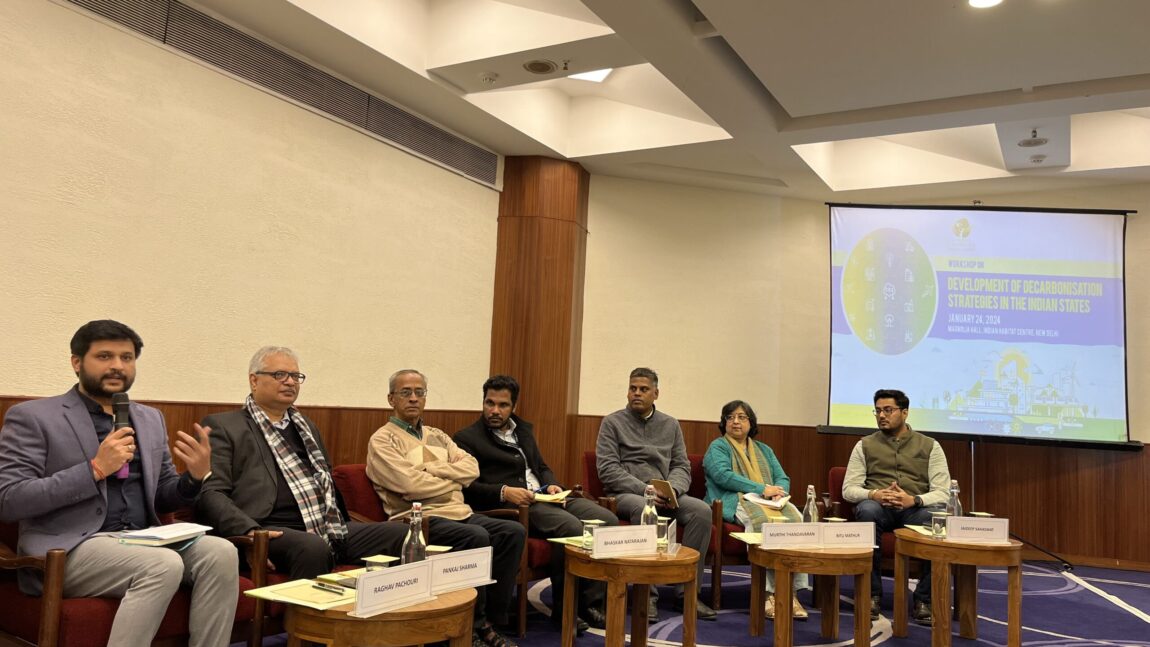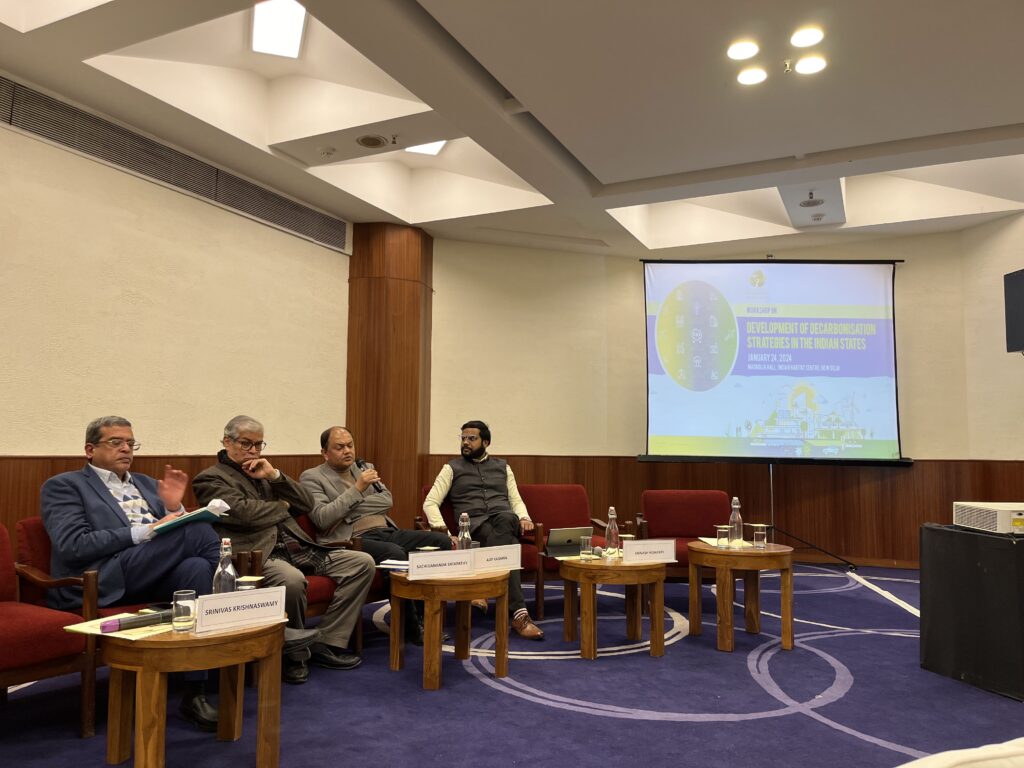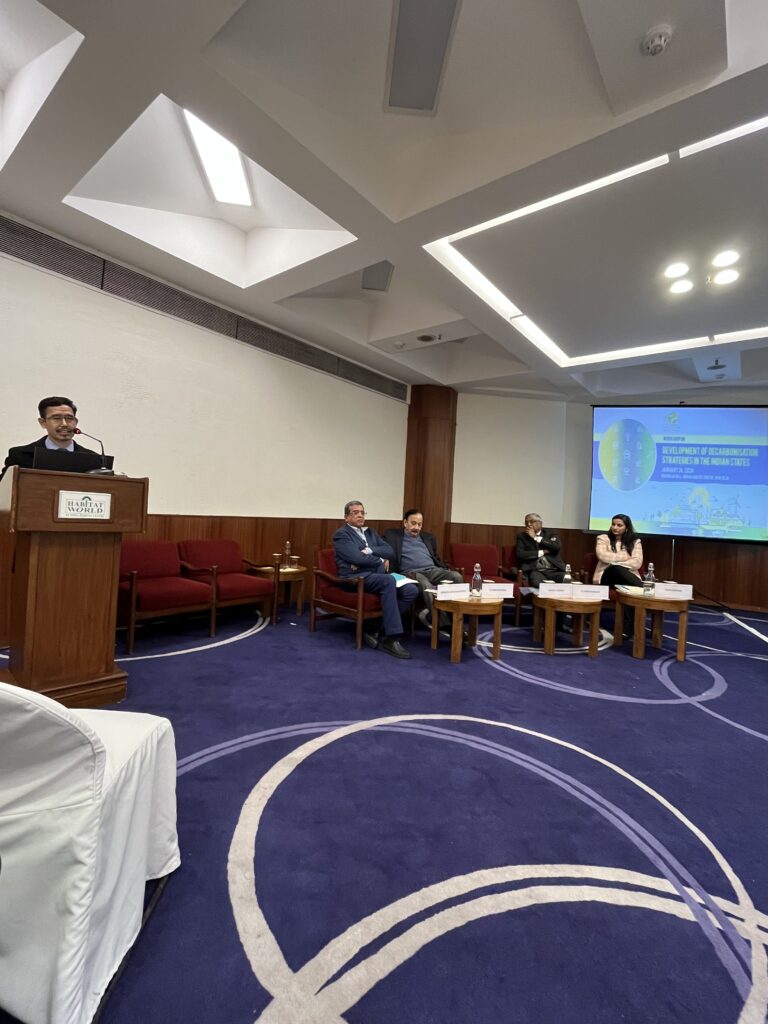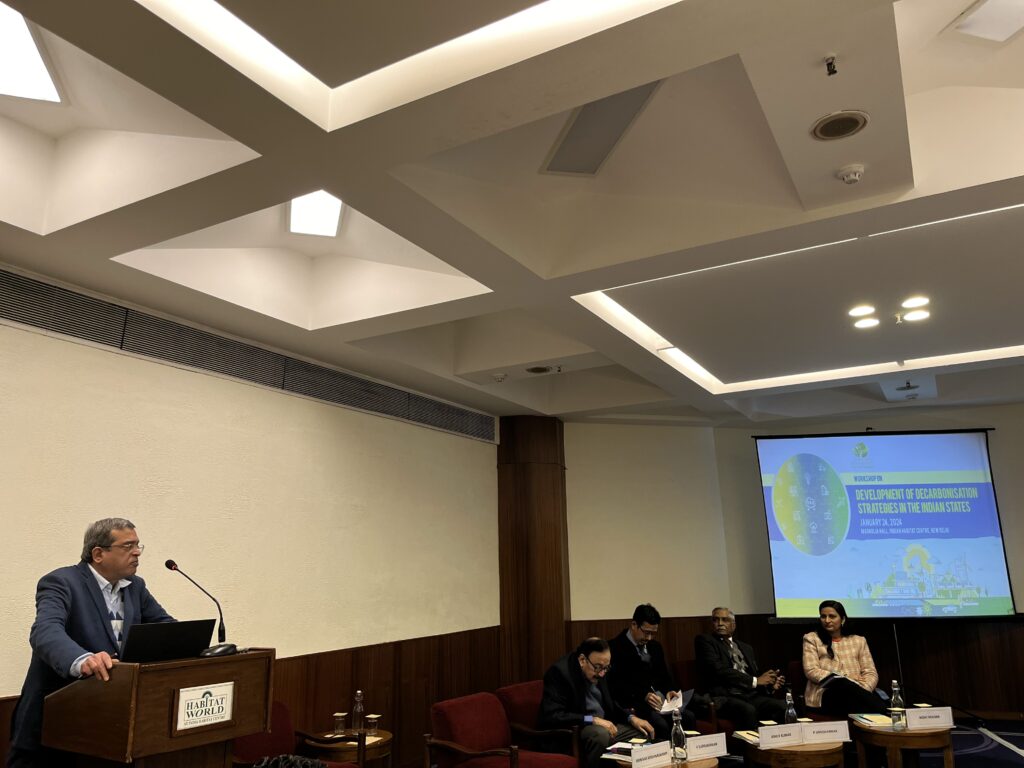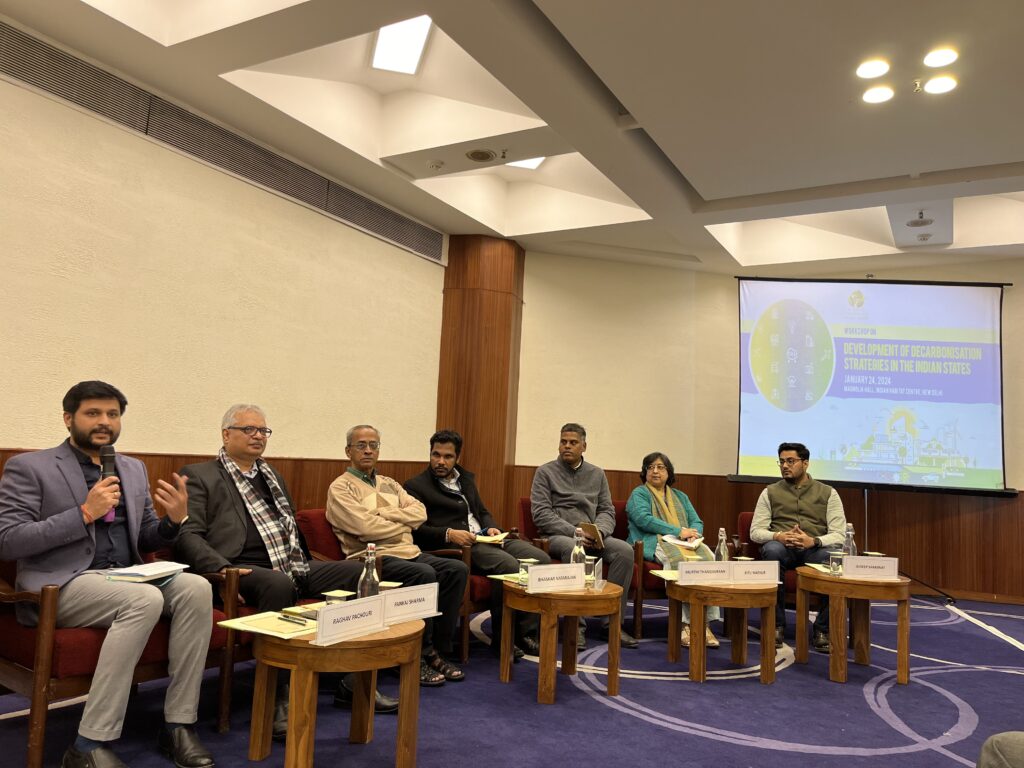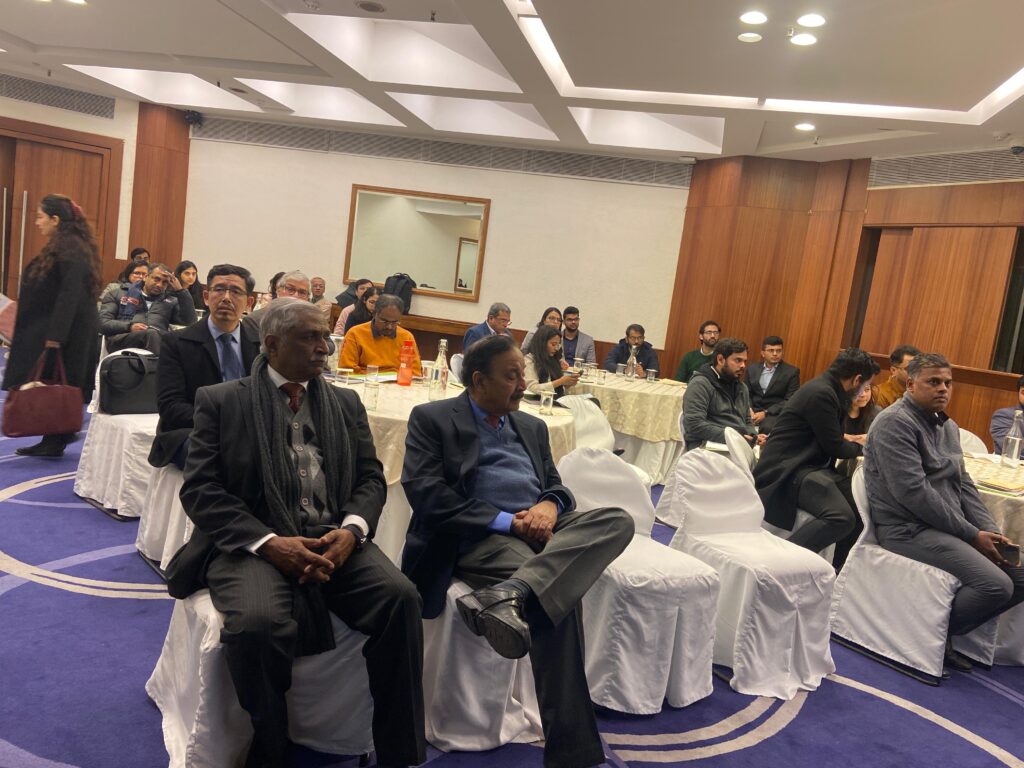24th January 2024 | Indian Habitat Centre, New Delhi
Vasudha Foundation organised a workshop on ‘Development of Decarbonisation Strategies in the Indian States’ on Wednesday, 24th January 2024, at Magnolia Hall, Indian Habitat Centre, New Delhi.
The workshop was attended by key participants from the Government of India, industries, academia, civil societies, and think tanks. The workshop was divided into three main sessions, the inaugural session followed by two technical sessions.
Inaugural Session:
In the inaugural session, Shri Srinivas Krishnaswamy, CEO, Vasudha Foundation, and Ms. Nidhi Madan, Associate Director, Shakti Sustainable Energy Foundation, extended a warm welcome to the dignitaries and participants. They also provided a contextual overview of the workshop.
Mr. Ashok Kumar, Deputy Director General, Bureau of Energy Efficiency (BEE), Mr. P Umashankar, Former Secretary, Ministry of Power, and Mr. V Subramanian, Former Secretary, Ministry of New and Renewable Energy extended their special remarks
Key takeaways from the inaugural session:
- A bottom-up approach starting from the local communities/Gram Panchayat/city/district levels needs heightened awareness to acknowledge the urgent reality of climate change.
- There is an urgent need to conserve energy use wherever applicable, employing various interventions such as adopting energy-efficient technologies and achieving energy savings through behavioural changes. Therefore, the national and subnational ministries and departments are required to spearhead various energy efficiency initiatives to enhance the efforts on conserving energy.
- The national and state action plans on climate change are required to be strengthened by introducing concrete plans, interventions, target-based activities, and setting up targets, that are revised frequently, to reduce emissions and address climate-related challenges effectively.
- Improving the operational and financial health of distribution companies (DISCOMs) will further strengthen the integration of renewable energy into the power system. Further, the impact of various distribution sector reforming schemes such as the Revamped Distribution Sector Scheme (RDSS), Ujwal DISCOM Assurance Yojana (UDAY), etc. needs to be assessed and brought out through data-backed analysis.
- The focus of climate action needs to go beyond conventional sectors and encourage innovative and inclusive approaches for meaningful impact in not-so-focused sectors such as waste management, agroforestry, behavioural changes, land use change, etc.
On the sidelines of the inaugural sessions, Vasudha Foundation also released two reports ‘An Outlook of India’s Electricity Demand Analysis and Projections for the Next Decade’ and ‘Managing Peak Electricity Demand in the Indian Electricity Sector’.
Technical Session 1
The inaugural session was followed by two technical presentations:
- Ms. Vrinda Sarda, Associate Director (Energy Transition), Vasudha Foundation demonstrated the ‘India Climate & Energy Dashboard (ICED)’, a data dashboard prepared jointly by NITI Aayog and Vasudha Foundation.
- Mr. Shubham Thakare, Manager (Energy Modelling), Vasudha Foundation, presented the findings of the two reports released during the workshop, ‘The Outlook of Electricity Demand and Peak Electricity Demand in India’.
The presentations were followed by a panel discussion on the ‘Role of Stakeholders for Developing Decarbonisation Pathways in the Indian States’, moderated by Mr. Raghav Pachouri, Associate Director, Vasudha Foundation. The diverse panel included Dr. Pankaj Sharma, Additional Director (D&ES), Petroleum Planning and Analysis Cell, Dr. Bhaskar Natarajan, Director Programs, Alliance for an Energy Efficient Economy, Mr. Murthi Thandavaran, General Manager, BSES Rajdhani Power Limited, Mr. Venugopal Mothkoor, Senior Specialist/Director, NITI Aayog, Dr. Ritu Mathur, Consultant, NITI Aayog, and Mr. Jaideep Saraswat, Associate Director, Vasudha Foundation.
Key takeaways from the Panel Discussion- I:
- Though various data portals on supply and demand data are available, the availability of data related to various end-use demand and energy efficiency measures such as the number of energy-efficient appliances, energy saved due to various interventions, efficiency in space cooling and lighting, etc. is still a bottleneck. Therefore, it was suggested to create state-level information platforms or portals to track and verify energy efficiency data and initiatives to support broader decarbonisation and net-zero strategies.
- Each state has a unique socio-economic profile, energy consumption patterns, natural resources, and its management systems. Therefore, the states in India need to develop and implement their strategies and plans to decarbonise their respective economies.
- Coordinated planning and policy-making across various sectors and levels of government (both at horizontal and vertical levels) are crucial for the overall decarbonisation of the state economy.
- Revamping the current state planning institutions is essential for better planning at the state level while ensuring alignment with transformational goals enabling comprehensive economic thinking beyond the state energy sector.
- The emphasis should be on understanding the localised contexts across states and districts considering the socio-economic factors, resources, and activity-level data. Accordingly, the tools and models used for assessment and projections need to be modified considering the broader integration of indicators across sectors, including electricity, transport, industries, agriculture, land use, labour force, and various other socio-economic factors. This integration is essential for the development of a holistic and inclusive plan for the energy transition in the state/district.
- The central and state governments, both are focusing on the use of alternative fuels like green hydrogen/ammonia and biofuels for decarbonising industries and transport sectors while ensuring energy security and sustainability. Therefore, the states play a crucial role in boosting the production of crops necessary for biofuel production to achieve the target of a 20 percent biofuel blend by 2025.
- The transition to renewable energy and EVs presents both challenges and opportunities in terms of grid management, infrastructure development, and balancing energy supply and demand.
- For instance, BSES Rajdhani has optimised and reduced its power purchase cost by taking an early mover advantage in procuring power from renewable sources.
- BSES Rajdhani is also focusing on the fast-charging infrastructure and is planning for coordinated EV charging during off-peak periods to reduce the range of the maximum and minimum demand during the day, i.e. flattening the daily demand curve in the region. However, comprehensive policy support is needed in these areas to promote green energy adoption.
- BSES is supporting solar rooftop installations through online portals and technical assistance to residents for faster and more timely rooftop facility setup.
- Awareness programs such as in-person booth camps, and capacity building at the grassroots level are essential for the successful implementation of new technologies or green initiatives like solar rooftops, electric vehicles, solar water pumps, etc.
Technical Session 2
The second-panel discussion was on the theme of ‘Role of Adaptation Strategies and Localising Climate Actions on Overall Decarbonisation’.
The panel was moderated by Mr. Srinivas Krishnaswamy, CEO, Vasudha Foundation and the panelists were Mr. Ajay Raghava, Director, Ministry of Environment, Forest, and Climate Change, Dr Sachidananda Satapathy, Expert Consultant, Vasudha Foundation, and Mr. Abinash Mohanty, Global Sector-Head Climate Change and Sustainability, IPE Global Limited
Key takeaways from the Panel Discussion- II:
- In India, the predominant focus of government missions and plans is on adaptation, given the country’s heightened vulnerability to climate change despite its minimal contribution to the global phenomenon.
- India shared its National Communication (NC), which provides details of the Greenhouse Gas (GHG) inventory of 2019, along with Initial Adaptation Communication to the United Nations Framework Convention on Climate Change (UNFCCC). It underscores our consistent contribution towards climate action while also prioritising socio-economic development.
- Localising climate action emphasises a bottom-up approach. This involves developing climate action plans at various levels – from Gram Panchayats to districts and cities, eventually aggregating to the state level. Therefore, empowering communities and local governing bodies at the grassroots level is crucial for the successful implementation and formulation of climate action plans.
- Adaptation measures offer co-benefits in terms of mitigation. Recognising and leveraging these co-benefits can be an effective strategy in climate action planning.
- It is essential to establish a uniform framework of guidelines for the assessment of state-level greenhouse gas inventories. Therefore, a national and subnational level collaboration is required to formulate a methodology and approach to estimate the GHG inventory in each state.
- Effectively integrating state-level action plans with national policies and targets poses the primary challenge. Furthermore, there is a need for clarity on climate finance definitions and more effective mechanisms to mobilise funds across states under various policies and schemes.
- Adequate preparedness is crucial for addressing and mitigating the impact of environmental changes, emphasising more on loss, and damage control measures.
The event was well attended, with over 65 participants from a wide spectrum of stakeholder groups. Participants and speakers both lauded the various works of the Vasudha Foundation, including the India Climate and Energy Dashboard, the sub-national work, and the initiative of organising this workshop.
The participants also made the workshop interactive and engaging by offering valuable interventions. The workshop concluded with the note that this initiative will be developed further to create state-wide decarbonisation pathways by incorporating the inputs gathered during the workshop.
For more information please download the background note attached below.




